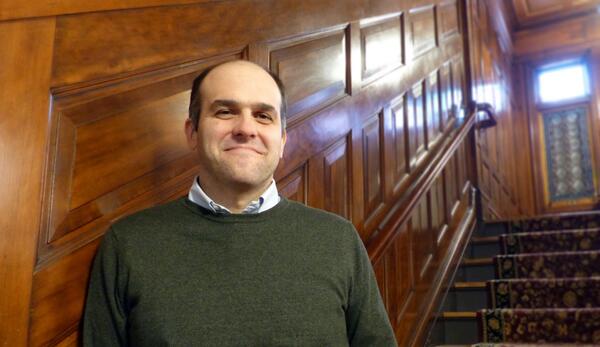Eduardo Dávila Wins Early Career Award to Advance Economics

Eduardo Dávila, assistant professor of economics, has earned a highly competitive five-year grant from the U.S. National Science Foundation’s Faculty Early Career Development (CAREER) Program. The award will advance his work in evaluating potential macroeconomic and financial policies through the lens of how they might affect individuals.
Much economic research focuses on descriptive measurements of how people make choices about the allocation of resources. Dávila’s research focuses on a set of complementary “normative” questions considering what economists call welfare assessments — what might be better or worse for all or a part of society.
“Some economists start by looking for measurements of reality,” Dávila said. “But it is difficult to know what is important to study. Taking a normative approach, you first look at the environment in a general way to see what can happen and what is desirable or optimal given that framework. Then you will have a guide for what aspects of reality you should measure.”
The NSF, an independent federal agency supporting science and engineering, describes CAREER funding as its “most prestigious awards in support of early-career faculty who have the potential to serve as academic role models in research and education and to lead advances in the mission of their department or organization.”
Prior to applying for the grant, Dávila attended a workshop sponsored by the Office of the Provost and worked closely with Limor Peer, associate director for research and strategic initiatives at the Institution for Social and Policy Studies (ISPS), to talk through his project proposals and the NSF program’s goals, assemble budgets, tailor the application’s language for effectiveness, and navigate the complicated submission process.
Last year, ISPS launched an effort to support external grant applications in line with its core mission to bolster and accelerate social science research. ISPS works with faculty members and research groups to find appropriate funding opportunities, assist in grant writing, respond to feedback from potential funders, and facilitate deadlines and other submission requirements.
“I am extremely honored to receive this award,” Dávila said. “And I am grateful to Limor and ISPS for encouraging me to apply, helping me put together an impactful proposal, and facilitating the process. There are many administrative components to a CAREER award application that are not easy to navigate, and ISPS made it easier.”
Dávila’s CAREER award will support five projects as well as educational components, including monographs or textbooks, lectures, workshops, and other forms of dissemination.
One project will provide a general framework for making assessments that separate the winners and losers of a proposed economic policy from pure aggregate gains of the policy’s overall efficiency.
“Economics is about giving you the tradeoffs,” Dávila said. “Our methodology will provide a systematic way to understand the implications of a policy for different groups of people.”
Other projects will include applying this overall framework to topics such as how different government mandates affect optimal monetary policies that explicitly incorporate impacts on diverse groups of people, determining a second-best policy choice when an optimal policy choice is not feasible, the efficiency properties of financial market trading, and the features of mutually beneficial borrowing agreements between countries.
Dávila believes his work has the potential to change cost-benefit analyses of public policies beyond long-term budget implications, such as those currently calculated by the Congressional Budget Office for pending federal legislation.
“Imagine in 10 years if Congress could compute the statistics — in a systematic and unambiguous way — and determine accurate assessments of efficiency and redistribution gains, especially in environments with significant risk and uncertainty,” he said. “It could be extremely useful in practice and compatible with any policy evaluation.”
For Yale faculty members interested in meeting with ISPS to discuss external grant opportunities, please email isps@yale.edu.